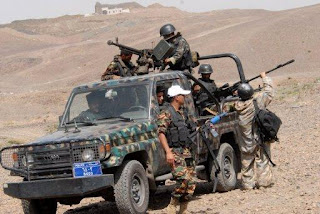 As Steve works over-time on the gubernatorial campaign of Minnesota's most classical liberal, State Senator David Hann, and Rob leads a Marine infantry rifle platoon in Afghanistan, Founders' Porch has been quiet in 2010. To start our comeback, here are two extended articles on how the US should defend Persian Gulf states against an imperial Islamic Republic, and how Yemen may be in over its head trying to "rehabilitate" terrorists.
As Steve works over-time on the gubernatorial campaign of Minnesota's most classical liberal, State Senator David Hann, and Rob leads a Marine infantry rifle platoon in Afghanistan, Founders' Porch has been quiet in 2010. To start our comeback, here are two extended articles on how the US should defend Persian Gulf states against an imperial Islamic Republic, and how Yemen may be in over its head trying to "rehabilitate" terrorists.The first, The Gulf States in the Shadow of Iran, appears in The Middle East Quarterly's Winter 2010 edition. It is a call for moral clarity in the U.S.'s noble efforts to secure the Persian Gulf from the Islamic Republic's encroachments. The Gulf states, with their human rights abuses and authoritarian instincts, are not to be bowed to. Indeed, they deserved no pity when the US invasion of Baathist Iraq proved unsettling to them. But now moral clarity requires standing with the Gulf states against a sworn-enemy: Iran. The US cannot afford to miss this opportunity by attempting short-sighted deal-making with Iran. It should stick to its principles by reaching out to the Gulf states. Here is an excerpt:
U.S. policy in the Persian Gulf should recognize that outreach to Iran since the "unclench your fist" inaugural address has failed. Iran has ignored Obama's diplomatic plea for the Islamic Republic to join "the community of nations."[69] Meanwhile, Tehran has capitalized on the June 30, 2009 U.S. troop withdrawal from Iraq: On July 16, an Iranian-backed militia killed three U.S. soldiers in Basra with an Iranian-made rocket.[70] Even though the Obama administration chose not to intervene on behalf of human rights protesters after the June presidential elections, on August 23, 2009, Iran's parliament voted to approve $20 million for exposing human rights abuses in the United States.[71] Iran has interpreted U.S. engagement attempts as desperation: Ahmadinejad's short-lived first vice president and current chief of staff, Esfandiar Rahim Masha'i, said in August that due to Ahmadinejad's "historic" world popularity, "the international community has no choice but to cooperate" with the regime.[72] Finally, as Washington cashes in a peace dividend, Iranian-made missiles and machine guns are landing in the hands of Yemen's Shi'i rebels. In a reference to Tehran, Yemeni information minister Hasan Ahmad al-Lawzi recently said, "There are religious authorities that are trying to interfere in the affairs of our country."[73]
Which leads to the other article, by Founders' Porch resident Yemeni terror scholar Chris Harnisch, whose reporting I cited in that last sentence. The US, he writes in his article at Critical Threats, may want to think twice before handing over Guantanano detainees to Yemen's summer-fun-camp rehabilitation program:
"[M]any Saudi terrorists from Guantanamo have been released into the Saudi rehabilitation program, which reportedly applies a de-radicalization curriculum revolving around sports, art therapy and other leisure activities,[3] only to return to the battlefield – sometimes in key leadership positions. The proposed Yemeni terrorist rehabilitation program will apparently be modeled on the Saudi program. "
Whether regarding Iranian meddling in the Persian Gulf or AQAP terrorism in Yemen, the US has a long road ahead in securing the Arabian Peninsula.
